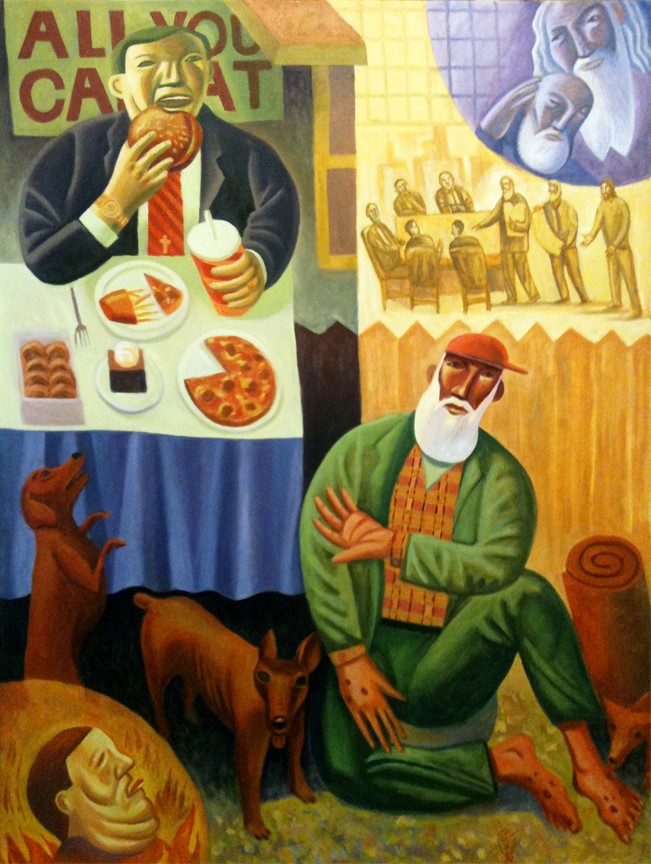Thursday, March 21
Readings: JER 17:5-10; LK 16:19-31
“More tortuous than all else is the human heart, beyond remedy; who can understand it?” says the prophet Jeremiah. I certainly hope it’s not beyond remedy, but the story Jesus tells today suggests that we have a lot of work to do.
Jesus tells the famous story of “The Rich Man and Lazarus” which is his tale about inequality and what happens when we have such wealth in the face of such poverty.

James Janknegt: The Rich Man and Lazarus
Lazarus (whose name means “God is my help”) is a poor beggar lying at the gate of a rich man who dresses well and feasts daily. The beggar has become just another object in the rich man’s landscape – his humanity made invisible, his suffering not even registering.
Both die, with the poor man going to heaven and the rich man going to hell. Even while in hell, the rich man keeps trying to use his power and influence to alter the situation. But to no avail. The rich man will be tormented – not by God – but by his own lack of compassion and failure to even notice the suffering of others while he had everything. Jesus ends by saying that, “Moses and the prophets,” are really all we need to understand this reality.
Scripture scholar Ched Myers, in his reflections on this passage, says that Luke is trying to offer us a specific kind of critique in this story. While other passages are described as “parables,” no such claim is made here. This is how it is. The writer, says Myers, is trying to “[strip] away layers of denial and propaganda that keep us distracted, to expose realities of suffering and injustice—seeing the world as it really is from the perspective of the poor and victims of violence; and [transfuse] our dulled and dumbed-down imaginations with visions of the world as it really could and should be from the perspective of divine love and justice.”
The current reality is that the inequality of our world far surpasses what the gospel writers could ever envision. I just saw a recent statistic that said that the wealth of the richest 3 people in the United States equals the wealth of the bottom 50 % of the population (that’s about 160 million people!). And that’s just here in the United States.
Most of us who are reading this reflection probably do not identify with Lazarus in the story. Our lives likely mirror the wealthy one who has tried to structure a life of privilege that avoids contact with and recognition of the poor and destitute. We may perform acts of charity, but do we really challenge the systems of inequality? What would that look like for us to do that in a substantive way? What would it look like for us to align our priorities, energy and resources with the marginalized?
There may not be “answers” to this gospel so much as deeper questions that we’d do well to engage – individually and collectively. Even though the task may be monumental (due to the enormity of the inequality), there is something essential about doing it if we are to be followers of Jesus.
Enter your email address to subscribe to our blog and receive notifications of new posts by email.
2 Comments
Sally Partner
I always struggle with this message, never feeling like I do enough to challenge and change the poverty and inequality in our society. I see the impact every day in my workplace, and try in my own individual way to do what I can both in my interactions with the people that we serve and that staff that serve them directly, as well as through political activities and charitable giving.
At the same time, I enjoy the things that a life of privilege provides-a nice home, food and wine, access to music and theatre,the occasional vacation trip, etc. Striking the right balance is a constant internal struggle that I pray about often.
Mike Boucher Author
Sally,
Thanks so much for this honest reflection. I suspect that many would be able to relate to the tensions that you try to hold, and may we all pray and work toward our deepening reflection on the gospels and what they might be inviting us to.
– Mike
Commenting has been turned off.